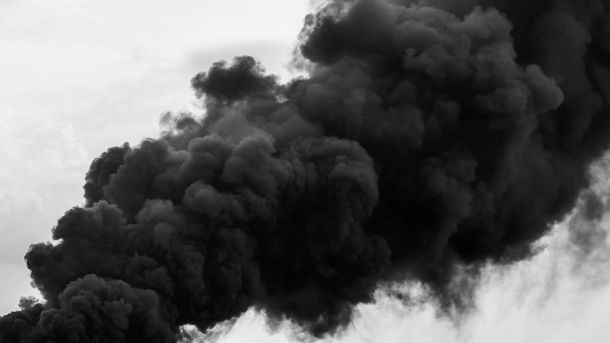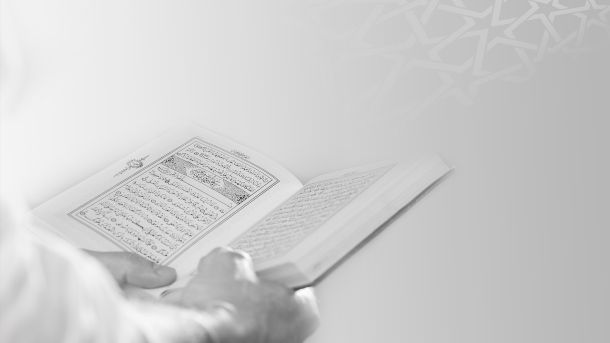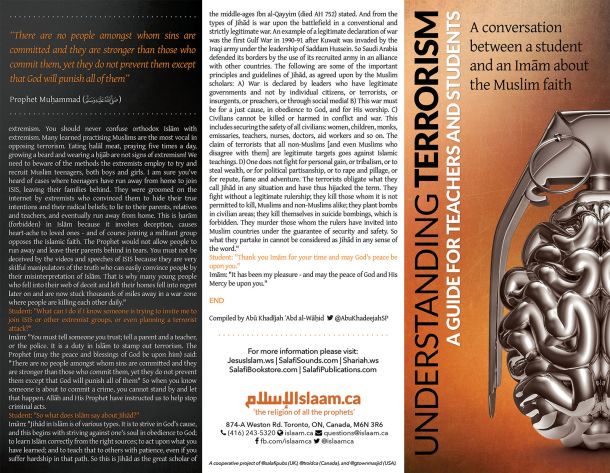News Archive
Apr 21, 2016
Some of the Signs of Ahl al-Sunnah
Firstly: they refrain from transgressing the boundaries of knowledge, they speak with that which they have knowledge of, and refrain from speaking about that which they do not have knowledge of. Allāh mentions:
وَلا تَقْفُ مَا لَيْسَ لَكَ بِهِ عِلْمٌ
And do not pursue that of which you have no knowledge.
[Al-Isrāʾ, 17:36]
This means that one must not falsely accuse or say something of which he has no knowledge of about Allāh. Rather, stop at your limits, if you know something of beneficial knowledge then speak with it, and if you know not about something then refrain (from speaking about it)…
Apr 21, 2016
Explanation of the Prophet’s Prayer ﷺ
An excellent and in depth series on the Prophet’s Prayer Described by Abū Muʿādh Taqwīm Aslam using the explanation of the Shaykh Muḥammah ibn Ṣāliḥ al-ʿUthaymīn (raḥimahullāh). In this very interactive seven part series, our noble brother goes into detail concerning the prayer and includes a number of scenarios in which certain rulings may differ. What you will find in this lecture series is an explanation of:
The meaning of the word ‘ṣalāḥ’ linguistically and it’s Islamic Sharʿī meaning
When and where the prayer was obligated
How many prayers were obligated and how many rakaʿāt ini…
Apr 2, 2016
Excerpt from the Great Life of Ibn Taymiyyah: His Imprisonment
[He did this] up until the prison became better than many mosques, gatherings of knowledge and schools with regards to being kept busy with knowledge of the religion. To the point that when some of the prisoners were granted their freedom, they chose to stay with him.
Al-ʿUqūd al-Dariyyah fī Dhikr Bʿaḍ Manāqib Shaykh al-Islām Ibn Taymiyyah by Ibn ʿAbd al-Hādī al-MaqdasīWhen Shaykh al-Islām Aḥmad ibn ʿAbd al-Ḥalīm ibn ʿAbd al-Salām ibn Taymīyyah al-Ḥarrānī (raḥimahullāh) was imprisoned, he found the prisoners busy and distracting themselves (from incarceration) with different types of games l…
Apr 1, 2016
The Distinguishing Signs of Ahl al-Sunnah in Their Love for The Scholars
Our noble brother Abū Khadījah concluded the previous session regarding the position of Ahl al-Sunnah regarding the Jamāʿah and being upon clarity with regards to their ʿaqīdah and those who have strayed from it from the deviants and the misguided ones. He continues this series entering into a discussion and explanation of the work of the great Imām Abū ʿUthmān al-Ṣābūnī (raḥimahullāh) drawing upon benefits from his treatise entitled ʿAqīdah al-Salaf wa Aṣ‘ḥāb al-Ḥadīth, The Creed of the Salaf and the Companions of Ḥadīth alongside the explanation of Shaykh Rabīʿ ibn Hādī al-Madkhalī (ḥafiẓ…
Mar 31, 2016
The Manhaj of the Salaf Concerning Those Who Oppose the Sunnah
Abū Khadījah gives a brilliant, detailed, and concise lecture concerning the position of the Salaf with respect to those who oppose the Sunnah of Allāh’s Messenger (ṣallallāhu ʿalayhi wa-sallam) and oppose the Daʿwah al-Salafīyyah. He draws upon the works and opinions of the noble scholars Shaykh Rabīʿ ibn Hādī al-Madkhalī, Shaykh Nāṣir al-Dīn al-Albānī, Shaykh Ṣāliḥ ibn al-ʿUthaymīn, Shaykh Ṣāliḥ al-Fawzān, and other than them (ḥafiẓahum Allāh). The lecture gives detailed insight into the obligation of sticking to the Sunnah, and taking from the Saḥābah and those who came after them from…
Mar 30, 2016
The Importance of Clinging Together upon This Religion
From the points discussed:
The importance of practising and maintaining Islām
Clinging to the rope of Allāh
Do not be split and disunited
The call to Islām needs to be devoid of splitting and differing
The Believers must cooperate with each other
Splitting is evil, uniting is goodness
Most of the Muslims today are divided
Goodness is in cooperation
The lone sheep is devoured by the wolf
The basis of clinging to the religion is adhering to tawḥīd
The patience of Nūh in calling to tawḥid, like all of the prophets
O Salafīs, stick to the scholars, be strong upon th…
Mar 23, 2016
Facing the Qiblah
When you rise, O’ Muslim, for the service of prayer, face the direction of the Kaʿbah wherever you are, in both the obligatory and supererogatory prayers.
Imām Muḥammad Nāṣir al-Dīn al-Albānī, Talkhīs Ṣifat Ṣalāt al-Nabī, (ﷺ) The Muḥaddith, al-Albānī [d. 1419H], may Allah have mercy upon him, wrote:1
1. When you rise, O’ Muslim, for the service of prayer, face the direction of the Kaʿbah wherever you are, in both the obligatory and supererogatory prayers. This is one of the integral elements of ṣalāh; without it, prayer is invalid.
2. The obligation to turn one’s face towards the qibl…
Mar 23, 2016
https://www.troid.org/wp-content/uploads/2016/03/understandingterrorism.pdf
Understanding Terrorism – A Guide for Teachers and Students
There are no people amongst whom sins are committed and they are stronger than those who commit them, yet they do not prevent them except that God will punish all of them.
Prophet Muḥammad (ﷺ)








